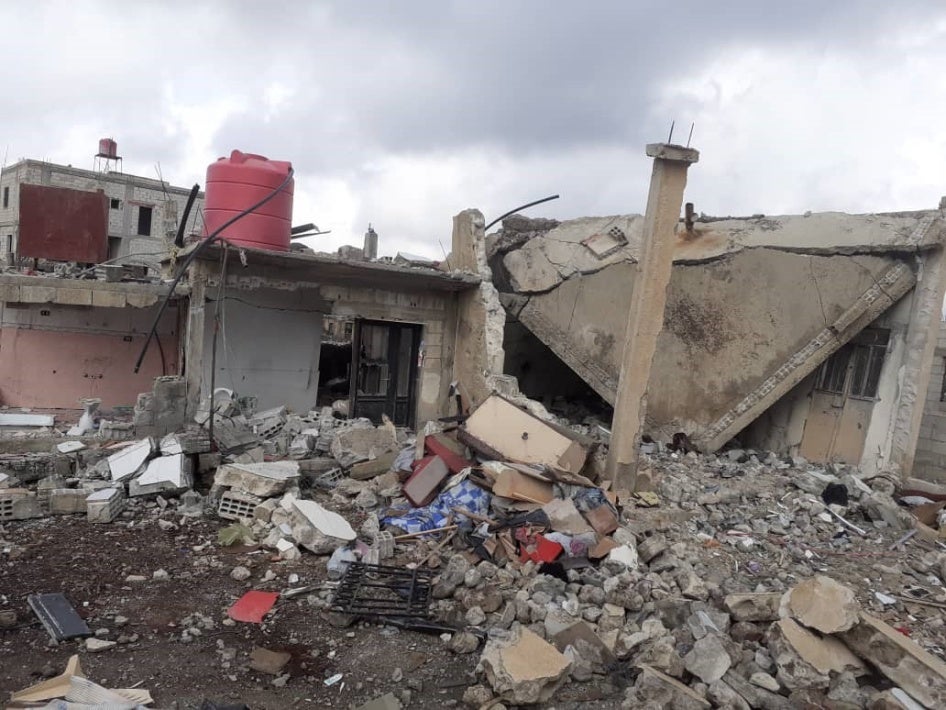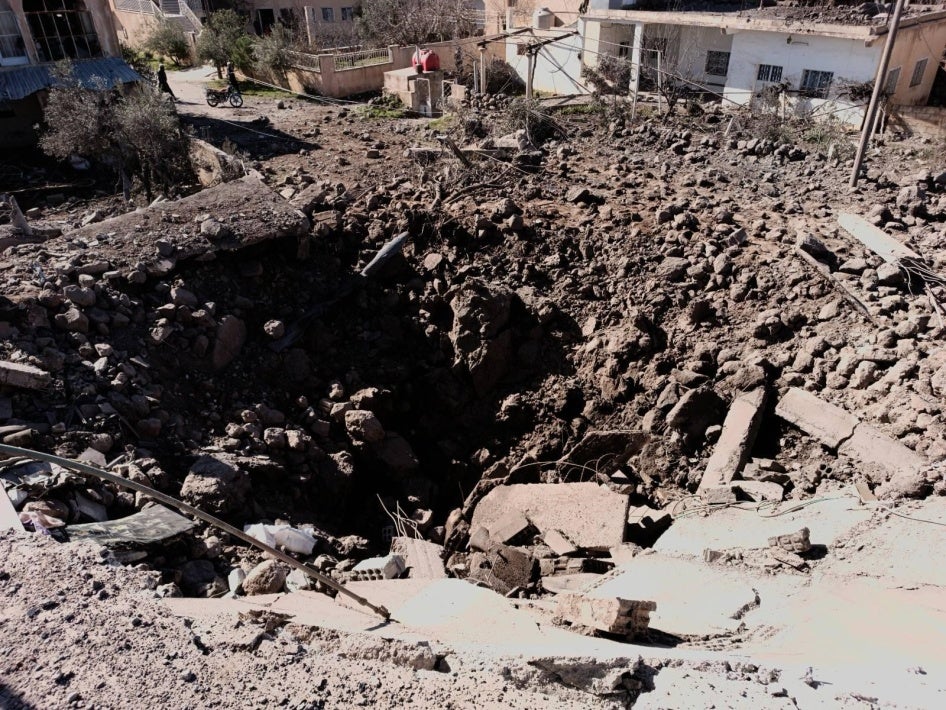Jordan should ensure accountability for airstrikes in southeast Syria that killed 10 people on January 18 and compensate the victims and their families, Human Rights Watch said today. The strikes, which killed women and children, appear to amount to extrajudicial executions.
The airstrikes were part of an intensified campaign by the Jordanian Armed Forces against drug and weapons traffickers following recent clashes on its border with armed groups reportedly carrying narcotics, arms, and explosives that it suspects are tied to pro-Iranian militias. On January 23, the Syrian government responded, saying there was no justification for Jordan's attacks. The Jordanian Foreign Ministry retorted, neither denying nor confirming the attacks, but emphasizing the threat posed by drug and weapons smuggling, its impact on Jordan's national security, and the lack of effective action by the Syrian government to combat such operations in its territory. Human Rights Watch wrote to Jordan's Foreign Minister on January 31 detailing its findings, but received no response as of the time of publication.
"Cross-border airstrikes that kill civilians demand scrutiny regardless of the threat posed by drug smuggling from southern Syria," said Adam Coogle, deputy Middle East director at Human Rights Watch. "Jordan should halt military strikes against non-military targets and compensate victims of previous attacks and their families."
On January 18, at around 1 a.m., airstrikes on the town of Orman in the southern governorate of Sweida struck a house in the eastern part of the town, destroying the house and killing its owner, Omar Taleb; his mother, Amal Zein Eldin; and his aunt, Etihad Taleb. 500 meters west, two munitions struck two of four connected houses in the center of the town, causing significant damage and killing the owner of one of the houses, Turki al-Halabi; his wife, Fatin Abu Shahin; and their two young daughters, 3-year-old Farah and 5-year-old Dima. It also killed their relatives Nazih al-Halabi, who owned another one of the houses, his wife Iqbal, and a relative, Roza al-Halabi. Three of the four connected houses belong to the al-Halabi family.
Human Rights Watch interviewed two relatives of the al-Halabi family who live nearby, and an activist and researcher at the local Suwayda24 news website. Researchers reviewed and confirmed photos, videos, and satellite imagery showing extensive damage to both sites, as well as photos of remnants collected from the site of the four connected houses that housed members of the al-Halabi family.
These photos, alongside evidence of a large crater, allowed for a positive identification of one of the weapons used: a 500lb-class JDAM satellite guided bomb. Jordan acquired 198 JDAM kits from the United States in February 2017.
"At 1 a.m., I was at home in Orman," said one relative. "I was with my wife and newborn girl. We heard warplanes and then a very big explosion nearby.
The relative said that he immediately went outside to see what happened and found the road to Turki al-Halabi's house, 65 meters away, damaged and "full of rocks." He said that when he reached Turki's house, he found it demolished with extensive damage to the two houses next to it. His own house, he said, had a broken window.
The relative said that al-Halabi family is a well-known Druze family in Sweida governorate. He said that Turki al-Halabi works in agriculture and Nazih al-Halabi, a retired colonel, often participated in Sweida's recent demonstrations for political reform. He said that neither men were involved in drug trafficking. Human Rights Watch could not independently verify this.
"We couldn't tell how many times we had been attacked," said the other relative, who lived across the street from the compound. "The fear, the sound, the dust and the screams of the kids, it was terrifying… All our windows were broken. When we saw what happened to my uncle's house, we were terrified, a total collapse. Around an hour later, we were able to rescue Nazih's children, all four of them were still alive."
According to Suwayda24, search and rescue operations in Orman lasted over 10 hours. One of the al-Halabi relatives pointed to a lack of access to legal avenues in Syria by which they can seek answers and justice. "Sweida is left behind," he said. "The government wants nothing to do with us."
The January 18 attacks were not the first Jordan is suspected of carrying out against alleged drug smuggling operations in southern Syria. At least five other attacks have been reported, the first on May 8, 2023. That strike targeted a home where Merie al-Ramthan, a local man widely believed to be heavily involved in the illegal drug trade, and his family were staying in al-Shaab village in Sweida governorate. The strike, which was investigated and reported by the Syrian Network for Human Rights (SNHR), killed al-Ramthan, his wife, and five children.
A statement from the Jordanian Foreign Ministry a few hours after the strike noted that the Jordanian and Syrian governments had reached an agreement to form a joint security force aimed at combatting the threat of drug trafficking and that the two governments had established communication lines. According to Suwayda24, three of the other four reported attacks killed nine people, including two children under the age of five. Jordan has neither claimed nor denied any of these attacks.
On January 16, just over a week after a round of airstrikes on a house and farm in Sweida governorate that killed three people, the spiritual leader of the Druze community in southern Syria, Sheikh Hikmat al-Hijri, expressed his support for Jordan's anti-trafficking operations, but implored Jordanian authorities to avoid civilian casualties and material losses.
On January 20, the Men of Dignity movement, the largest armed group in the governorate, publicly proposed a nine-point initiative to Jordanian authorities that would involve cooperation on issues relating to combatting drug trafficking, holding the Syrian government directly responsible for the issue, and outlining their willingness to pursue individuals involved in drug trafficking, following the Jordanian side's sharing of lists naming those implicated. The movement also called for a halt to military operations against civilian sites, transparent investigations into deaths from the strikes, and compensation for damages.
On January 7, a day after the Jordanian army said it killed five drug and weapon smugglers and arrested 15 during clashes with armed groups of smugglers on its border with Syria, Media Director for the Jordanian Armed Forces Brigadier-General Mustafa al-Hiyari said in an interview with state-owned al-Mamlaka news agency, "the armed forces will use force as necessary and by all means to prevent the threat to Jordan's national security."
The right to life is an inherent human right that cannot be compromised, even in times of armed conflict or state of emergency. Summary, extrajudicial, or arbitrary executions are prohibited under international law, including under the International Covenant on Civil and Political Rights. The United Nations Manual on the Effective Prevention and Investigation of Extra-legal, Arbitrary and Summary Executions says that the duty to investigate is "triggered" not only in a clear case of an unlawful death, but also where there are "reasonable allegations of a potentially unlawful death," even without a formal complaint. Family members should also have the right to full information about the circumstances and causes of the deaths and to participate in the investigation.
Jordan should ensure thorough and impartial investigations into the January 18 airstrike and previous strikes, including to establish how and with whom any policy originated, and ensure that those responsible for the violations are held accountable, Human Rights Watch said. Victims' families should be compensated for the unlawful killings. Jordan's international partners that provide military and security assistance should ensure that no funds or support they provide are used for unlawful killings or other human rights abuses.
"The last decade in Syria has generated an ever-lengthening list of atrocities and impunity," Coogle said. "Jordan should not add to this by killing bystanders while targeting drug operations in Syria."









